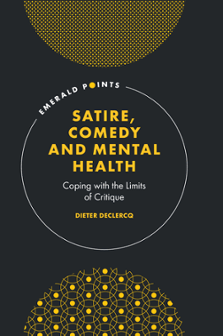
Index
Satire, Comedy and Mental Health: Coping with the Limits of Critique
ISBN: 978-1-83909-667-9, eISBN: 978-1-83909-666-2
Publication date: 13 January 2021
Citation
Declercq, D. (2021), "Index", Satire, Comedy and Mental Health: Coping with the Limits of Critique, Emerald Publishing Limited, Leeds, pp. 135-139. https://doi.org/10.1108/978-1-83909-666-220211007
Publisher
:Emerald Publishing Limited
Copyright © 2021 Dieter Declercq
INDEX
Note: Page numbers followed by “n” indicate notes.
See also Safety valve model
See also Entertainment
See also Nihilism
See also Cinema; Comedy; Humour